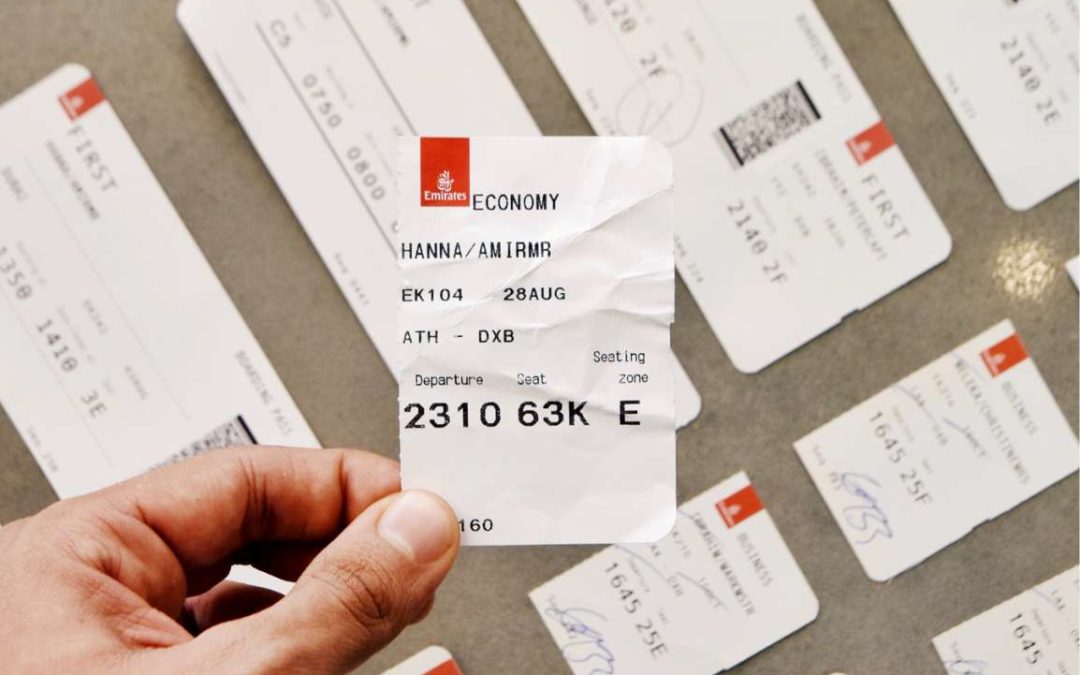
by Andreas Vogeler | 05.05.2022
Bringing forward the departure time as a cancellation? ECJ judgment of 21.12.2021 – C-263/20 (Airhelp)
Guiding principle
Article 2(l) and Article 5(1)(c) of Regulation (EC) No 261/2004 of the European Parliament and of the Council of 11 February 2004 establishing common rules on compensation and assistance to passengers in the event of denied boarding and of cancellation or long delay of flights, and repealing Regulation (EEC) No 295/91, must be interpreted as meaning that a flight is regarded as being ‘cancelled’ in the case where the operating air carrier brings that flight forward by more than one hour.
Circumstance
Two passengers booked a flight of the operating air carrier Laudamotion from Palma de Mallorca (Spain) to Vienna (Austria) via an electronic booking platform. […]
The departure of the booked flight, originally scheduled for 14 June 2018 at 2.40 p.m., has been brought forward by the operating air carrier by more than six hours to 8.25 a.m.
Airhelp, to which the two passengers waived their possible claims for compensation under Regulation No 261/2004, brought an action before the Bezirksgericht Schwechat (District Court, Schwechat, Austria). It claimed that under Article 7(1)(a) of the Regulation, the operating air carrier owed a total of EUR 500 to the two passengers because the flight in question had been brought forward by more than six hours; Passengers were only informed of this via the booking platform on 10 June 2018, four days before the scheduled departure.
The Landesgericht Korneuburg (Regional Court, Korneuburg, Austria), as the court of appeal, wishes to know whether the bringing forward of a flight constitutes a ‘cancellation’ within the meaning of Regulation No 261/2004 and the extent to which the operating air carrier is obliged to provide information.
Decision
The ECJ states that the term ‘cancellation’ is defined in Article 2(l) of that regulation as ‘the non-performance of a scheduled flight for which at least one seat was reserved’. The term ‘flight’ is not defined in the regulation. However, according to settled case-law, a flight consists of an ‘air carriage operation which thus constitutes, in a certain way, a ‘unit’ of that transport carried out by an air carrier which determines the corresponding route’ (judgment of 4 July 2018, Wirth and Others, C-532/17, EU:C:2018:527, paragraph 19).
Furthermore, the Court has held that the route is an essential element of the flight operated according to a timetable drawn up in advance by the air carrier (judgment of 19 November 2009, Sturgeon and Others, C-402/07 and C-432/07, EU:C:2009:716, paragraph 30).
Moreover, it does not follow from the definition in Article 2(l) of Regulation No 261/2004 that the ‘cancellation’ of a flight within the meaning of that provision requires, in addition to the fact that the flight originally envisaged was not operated, an express decision to cancel it (judgment of 13 October 2011, Sousa Rodríguez and Others, C-83/10, EU: C:2011:652, paragraph 29).
It is true that Article 2(l) and Article 5(1) of the regulation do not govern how the advance of a flight is to be treated. In that regard, the other carriage provided for in Article 5(1).c(1)(ii) and (iii ) refers to cases where a flight is brought forward. It follows that there is no obligation to pay compensation if the passenger departs with the replacement carriage no more than one or two hours before the scheduled departure time and reaches his final destination no more than four or two hours after the scheduled arrival time.
It must be inferred from this that the EU legislature has recognised that bringing forward a flight may also be fraught with considerable inconvenience, since it deprives them of the possibility of freely disposing of their time and organising their journey or stay in accordance with their expectations. The advance forces the passenger to make considerable efforts to reach his flight.
As regards the distinction between a significant and an insignificant advance of a flight, the provisions of Article 5(1)(a.c para. (ii) and (iii) of Regulation No 261/2004.
From Art. 5 para. 1 lit.c para. (iii) of the regulation shows that an advance of one hour or less is liable to exempt the operating air carrier from its obligation to pay compensation to the passenger under Article 7 of that regulation. It must therefore be held that, in order to determine whether the advance is significant or irrelevant for the purposes of applying Article 5 of that regulation, it is important whether it is more than one hour or less.
Note
The decision fits into the previous jurisprudence of the ECJ to ensure a high level of protection for passengers. The decision shows the incompleteness of the Air Passenger Rights Regulation. On the basis of the legal definition, the Air Passenger Rights Ordinance itself expressly regulates only the case in which a planned flight for which a seat was reserved is not carried out (cf. Art. 2 lit. i Regulation (EC) 261/2004). With an unbiased reading, any addressee of the norm should be able to interpret this provision in such a way that if a planned flight is brought forward, this flight is not to be regarded as cancelled, but is merely postponed. Nevertheless, the ECJ assumes a cancellation of the flight and justifies this with the “planning element” of the flight. In this respect, the ECJ seeks to draw a distinction between merely changing flight planning and abandoning flight planning. The assumption that the advance of a planned flight from one hour, regardless of the planned departure time, is always to be equated with a complete task of flight planning, seems strange – even if the reasons for this are understandable. Rightly, it should be the task of the European legislator to expressly regulate the advance of a flight and the resulting rights and obligations of passengers and airlines. With the mere reference to Art. 5 para. 1 lit.c para. ii, iii Regulation (EC) 261/2004 and the “legislative will” derived from it, the ECJ interprets its interpretative competence very broadly. The assumption that the advance of a flight by 1 hour is to be equated with a non-execution of the flight could even be assessed as an inadmissible interpretation contra legem according to the German understanding.
The decision not only has economic consequences for the airlines (obligation to pay compensation pursuant to Art. 7 Regulation (EC) 261/2004, right to ticket refund, Art. 8 para. 1 lit. a Regulation (EC) 261/2004), but also leads to the information obligations pursuant to Art. 14 Vo (EC) 261/2004.
A violation of those information obligations under Art. 14 VO (EC) 261/2004 is proven in Germany. Advance transfers of a flight of more than one hour, of which the passenger has not been informed at least 14 days before departure, and if the passenger has not been informed of his or her rights, thus constitute an administrative offence without this being apparent from the underlying legal basis. Unfortunately, the ECJ does not take these consequences into account in its decision.

by Andreas Vogeler | 05.05.2022
Postponement of the departure time as a cancellation? ECJ judgment of 21.12.2021 – C-395/20 (Corendon Airlines)
Article 2(l) and Article 5(1) of Regulation (EC) No 261/2004 of the European Parliament and of the Council of 11 February 2004 establishing common rules on compensation and assistance to passengers in the event of denied boarding and cancellation or long delay of flights and repealing Regulation (EEC) No 295/91 must be interpreted that a flight cannot be considered ‘cancelled’ within the meaning of these provisions if the operating air carrier postpones its departure time by less than three hours without any other change to the flight.
Circumstance
The passengers concerned booked a package tour via the “Check24” internet platform. Your booking has been confirmed by Corendon Airlines, the operating air carrier, for a flight scheduled to depart from Düsseldorf (Germany) to Antalya (Turkey) on 18 May 2019 with a scheduled departure time at 1.20 p.m. and a scheduled arrival time of the same day at 5.50 p.m.
As a result, Corendon Airlines postponed this flight while retaining the flight number and set the new departure time at 4.10 pm and the new arrival time at 8.40 pm on 18 May 2019; it informed the passengers concerned of this nine days before the start of the flight. The changed flight was delayed; the departure took place at 17:02 and the landing at 21:30 on May 18, 2019.
The passengers concerned requested compensation from Corendon Airlines of EUR 400 each under Article 5(1)(.c) and Article 7(1)(.b) of Regulation No 261/2004.
Decision
The ECJ notes at the outset that the term ‘cancellation’ is defined in Article 2(l) of Regulation No 261/2004 as ‘the non-performance of a planned flight for which at least one seat was reserved’.
The term ‘flight’ is not defined in the regulation. However, according to settled case-law, a flight consists of an ‘air carriage operation which, to a certain extent, constitutes a ‘unit’ of that transport carried out by an air carrier which determines the corresponding route’ (judgment of 4 July 2018, Wirth and Others, C-532/17, EU:C:2018:527, paragraph 19).
Moreover , the Court has held that cancelled and delayed flights constitute two clearly separate categories of flights. It cannot therefore be inferred from that regulation that a delayed flight may be classified as a ‘cancelled flight’ solely because the delay, even significant, took longer (judgment of 19 November 2009, Sturgeon and Others, C-402/07 and C-432/07, EU:C:2009:716, paragraph 33).
Therefore, where passengers are carried on a flight whose departure time is delayed compared to the originally scheduled departure time, the flight can be considered ‘cancelled’ only if the air carrier carries the passengers on another flight whose original schedule differs from that of the flight originally scheduled (judgment of 19 November 2009, Sturgeon and Others, C-402/07 and C 432/07, EU:C:2009:716, paragraph 35).
The fact that the passengers concerned were notified of the change in departure time several days in advance does not in itself affect the distinction between the terms ‘delay’ and ‘cancellation’.
It would be contrary to the traditional meaning of the terms in Regulation No 261/2004 and its scheme to consider that a postponement of an otherwise unchanged flight by less than three hours, announced several days in advance, constitutes a ‘cancellation’ within the meaning of Article 2(l) of that regulation.
Note
On the same day, the ECJ ruled in a judgment of 21.12.2021 – C-263/20 (Airhelp) that bringing forward a planned flight by one hour was to be equated with a cancellation. A postponement of the flight by less than 3 hours, on the other hand, is not to be equated with a cancellation.
The reasoning of the ECJ is to be agreed. Delays and cancellations are categories that can be clearly separated from each other. According to previous case law of the ECJ, the equal treatment of a long delay with a cancellation does not depend on an announcement of a delay, but on the actual arrival delay. However, this should also mean that in the case of short-term flight time changes (< 14 days), the originally planned flight time and not the changed flight time is decisive for the calculation of an arrival delay.

by Andreas Vogeler | 19.02.2022
Introduction
The aviation industry has indeed been beset with crises in the recent past. The 9/11 terror attacks in 2001, the 2008-2009 global economic crisis, and the volcanic ash cloud from the Eyjafjallajökull volcano in Iceland in 2010 immediately spring to mind here. However, none of these previous upheavals affected the aviation industry to an extent comparable with the current corona pandemic. Combined with the Fit for 55 package adopted on 14.07.2021 by the European Commission as part of the European Green Deal, which proposes to reduce greenhouse gas emissions by at least 55% by 2030 compared to 1990 levels, this crisis presents aviation with unprecedented challenges. The beginning of 2020 saw air carriers compelled to cease flight operations, sometimes completely until further notice, with the consequence that millions of passengers contacted airlines looking to get their tickets reimbursed. The simultaneous dwindling demand for bookings tore a huge hole in the budgets of numerous airlines, so drastic that they only survived thanks to state assistance.[1] The question about how airline companies and airports can achieve the European Green Deal targets despite the falling turnover and threats to their very existence, is one that currently remains unanswered. Eurocontrol is predicting that it will be 2024 before the 2019 level of traffic is again achieved:
Source: https://www.eurocontrol.int updated: 06.01.2021

Ticket refunds as a problematic legal area caused by the pandemic
From a legal perspective, the pandemic clearly shows that the European legislator had not envisaged any kind of global pandemic when it drafted the Flight Compensation Regulation (EC No 261/2004) of 17 February 2005.
A lack of available personnel resources meant it became impossible to reimburse tickets within 7 days, as required under Art. 8(1)(a) Flight Compensation Regulation (EC No 261/2004). The fact that every failure to meet this time limit is also punishable with a fine pursuant to Section 58(1) no. 13 German Aviation Act (LuftVG) in conjunction with Section 108(2) no. 2 German Air Traffic Approval Order (LuftVZO), Sections 30(1), 130(1) German Administrative Offences Act (OWiG) in conjunction with Section 9(1) no. 1 OWiG, appears extremely unfortunate given the context.
Who all has to pay?
Then there is the problem that rescinding the contract of carriage, including the reversal of payments, is anything but clearly regulated, and furthermore, the existing regulations are inadequate given the complexity of the contractual relations. The passenger is generally free to choose whether to base his or her reimbursement claim on the contractual claim to a refund due to the cancellation, or he or she can rely on the Flight Compensation Regulation. In the first case the correct defendant is the contracting partner, while the operating carrier will be the addressee of the claim in the latter instance. A well-advised passenger will pursue both avenues out-of-court. The contracting partner is generally the ticket-issuing company. This can be a consolidator or an airline. If the flight is operated by several different carriers because it comprises multiple connecting flights, the case law of the CJEU holds that each of the connecting flight operating carriers are liable for the total ticket price (Judgement of 11.7.2019 – C-502/18. CS and Others v Ceské aerolinie). However, in practice the contracting carrier often collects the ticket price for its flight segment only if the passenger actually takes the flight. Therefore, in the event of a cancellation, it can happen that a flight segment operating carrier never actually receives the ticket price, but has to reimburse the entire cost of the ticket, regardless. In the absence of any shared reservation software, it is frequently impossible for the obligor to identify if another obligor has already paid in response to a passenger’s claim, so there is a risk that payments may be made multiple times, and that any rights of redress of operating carriers among one another go unfulfilled.
Who is the claimant?
Another still unresolved problematic legal area comes with the absence of rules defining the locus standi for claiming a refund, so it is uncertain who really is the reimbursement claimant pursuant to Art. 8(1)(a) first indent Regulation (EC) No 261/2004. When it comes to compensation, this is undeniably the actual air passenger. In the case of ticket refunds, whether the claim rests with the individual passenger, the person who made the booking, or with the person paying is a matter of debate. The Regulation merely sets out the individual passenger’s specific option to claim either reimbursement of the ticket price or a re-routing arrangement. So, it is frequently unclear who the airlines are supposed to reimburse.
Considering the aforementioned 7-day time limit, it is generally in the airline’s interest to make the payment to the ticket booker since their contact details and payment method will already be known to it, so allowing the cancellation and repayment to be performed quickly and easily (see for example, Local Court of Wedding, Judgment of 17.08.2021 – 14 C 601/20; Local Court of Wedding, Judgment of 19.10.2021 – 14 C 652/20). The contract of carriage will generally set out this mode of repayment. Looking at Art. 15(1) Regulation (EC) No 261/2004, some of the case law maintains that such a provision is unenforceable because the passenger is personally entitled to the payment claim. This issue becomes even more complex when the ticket was booked by a travel agent, the airline refunds the ticket price to the agent, but, contrary to Art. 6.3 of the IATA Resolution 896, the agent fails to forward the payment to the passenger, or does so outside of the 7-day time limit.
Conclusions
The CJEU has yet to issue a decision on locus standi, and one is urgently needed. Nor are there any current indications of a forthcoming reform of the Flight Compensation Regulation. The decision of the Berlin Regional Court (Judgment of 29.11.2019 – 101 O 93/19) can provide assistance here. In those proceedings, the Regional Court had to make a ruling on our client airline’s contractual clause, according to which “Reimbursements shall be made either via the original payment medium or another payment medium, but also to the ticket booker if the original payment medium is no longer available.” The Berlin Regional Court ruled that this clause was effective, and that the sole purpose of the provision was “to give the Respondent certainty that it is making repayments to the right person.”
[1] Re. associated competition issues, see the Judgement of the General Court of 14.07.2021, Case T-677/20.




